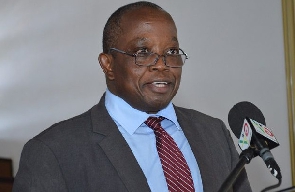 Daniel Yaw Domelevo, Auditor-General
Daniel Yaw Domelevo, Auditor-General
To sustain these gains however, the Auditor-General has recommended to the Ministry of Local Government and Rural Development on the need to deal with some deficiencies in the areas of planning and budgeting; project implementation and project administration and payment for work done.
The Ministry of Local Government and Rural Development has duly declared its intention to tackle such deficiencies. The DDF has been made all the more critical to beneficiary MMDAs since government, in 2017, put a ceiling on the proportion of monies from the consolidated fund that is allocated to statutory funds including the District Assemblies Common Fund which is the primary source of revenues for local governments. That move aims to give government more flexibility in its budgetary allocvations.
In all, three projects each from 30 MMDAs constructed between 2008 and 2019 were used in the performance audit to determine whether they meet the desired standard specifications..
This falls in line with Section 13e of the Audit Service Act, (Act 584) to find out how the Assemblies initiated, planned and implemented DDF funded infrastructure projects as well as to ascertain whether Assemblies were capable of planning, procuring contractors, supervising and monitoring the delivery of selected projects in accordance with laid down principles and practices to ensure value for money.
Various assessments of DDF projects have indicated significant impact including higher completion rates compared to those funded by the District Assembly Common Fund (DACF) and Ghana Education Trust Fund (GETFund). The better completion rates, the report noted was due to DDF projects quicker fund disbursement mechanisms.
The Facility was designed to spend about 88 percent of the annual allocation on infrastructure projects and the remaining on capacity building.
Out of these projects, 97 percent have been completed and handed over to beneficiaries and are currently in use with educational facilities accounting for 40 percent, followed by sanitation and health with 15 percent and 12 percent respectively.
By the end of 2018, more than GH¢848 million had been invested in 6,490 small scale infrastructure projects across MMDAs while close to GH¢63 million had been spent to build the capacity of MMDAs staff.
Importantly, “No MMDA should use DDF funds to award any new contract when their work plan and budget are not approved by the Ministry”, report indicates.
Background
The DDF was set up with an objective to improve the performance of MMDAs in Ghana by providing incentives to MMDAs that comply with existing legal and administrative procedures.